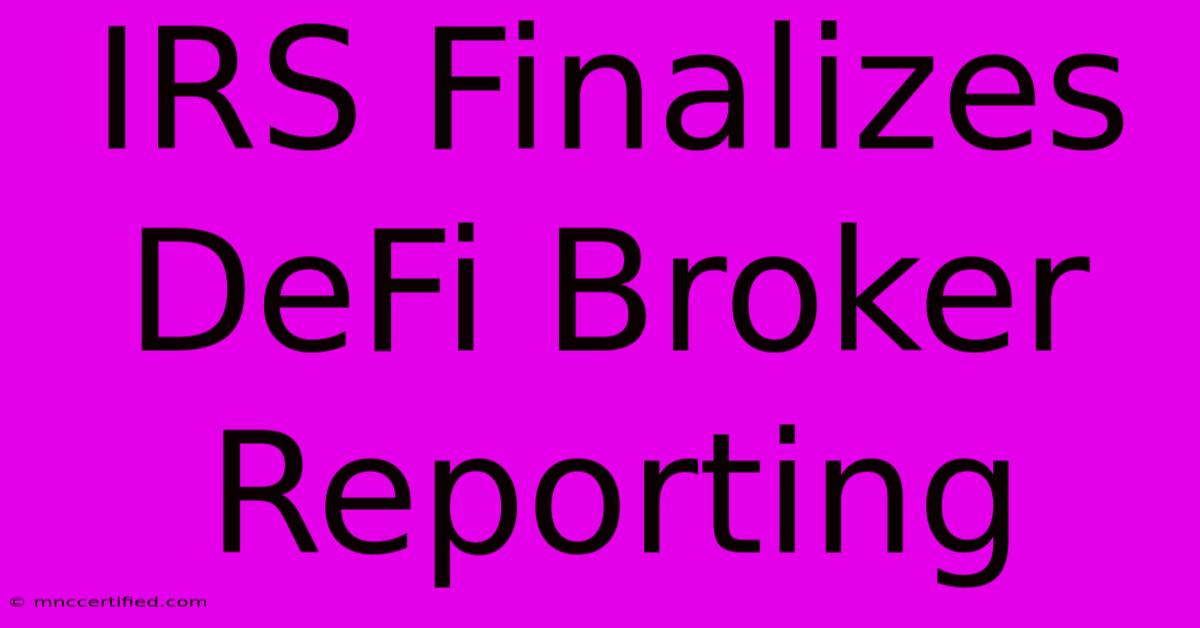IRS Finalizes DeFi Broker Reporting

Table of Contents
IRS Finalizes DeFi Broker Reporting: What You Need to Know
The IRS has finalized its regulations regarding the reporting of digital asset transactions, significantly impacting the Decentralized Finance (DeFi) space. This means significant changes for brokers involved in DeFi activities, and a need for increased transparency and compliance for all users. This article will break down the key aspects of these finalized regulations and what they mean for you.
Understanding the New DeFi Broker Reporting Rules
The IRS has broadened its definition of a "broker" to include individuals and entities facilitating the exchange of digital assets, even within decentralized platforms. This expansion is crucial as it encompasses a wide range of DeFi activities previously considered outside the scope of traditional broker reporting. The new rules effectively bring numerous DeFi participants under the purview of existing reporting requirements, specifically focusing on information reporting for digital asset transactions.
Key Changes and Implications:
-
Expanded Broker Definition: The most significant change is the broadened definition of a "broker." This now includes anyone facilitating transactions, including those operating on decentralized exchanges (DEXs), automated market makers (AMMs), and other DeFi platforms. This is a significant shift from the previous, narrower interpretation. This affects a much wider range of individuals and entities than previously anticipated.
-
Increased Reporting Requirements: Brokers will now be required to report a more extensive range of transaction information to the IRS. This includes details such as the amount of the transaction, the date of the transaction, and the identities of the parties involved. Failure to comply can result in significant penalties.
-
Focus on Tax Compliance: The ultimate goal is to enhance tax compliance within the DeFi ecosystem. By capturing a broader range of transactions, the IRS aims to reduce tax evasion and ensure fair tax collection. Understanding your obligations is crucial to avoid potential legal repercussions.
-
Impact on DeFi Users: While the reporting obligations primarily fall on brokers, DeFi users should be aware that their transaction data will likely be reported to the IRS. Maintaining accurate records of your DeFi transactions is essential.
Who is Affected by these New Regulations?
The new regulations cast a wide net, impacting numerous players within the DeFi ecosystem:
-
DEX Operators: Platforms facilitating peer-to-peer digital asset swaps are directly impacted and must comply with broker reporting requirements.
-
AMM Providers: Automated market makers, which automatically execute trades based on algorithms, are now classified as brokers.
-
Custodial Services: Any service providing custodial services for digital assets, even within a DeFi context, falls under these regulations.
-
Software Developers: Developers creating tools or platforms facilitating DeFi transactions may also face broker classification depending on their specific role.
How to Ensure Compliance
Navigating these new regulations requires careful planning and adherence to best practices:
-
Seek Professional Advice: Consulting with a tax advisor or legal professional specializing in cryptocurrency and DeFi is crucial. They can guide you through the complexities of the new regulations and ensure your compliance.
-
Maintain Accurate Records: Meticulously keep track of all your DeFi transactions, including dates, amounts, and involved parties. This is critical for both tax purposes and potential audits.
-
Stay Updated on Regulatory Changes: The regulatory landscape for DeFi is constantly evolving. Stay informed about any updates or clarifications regarding these new regulations.
-
Implement Robust Compliance Programs: If you operate a DeFi platform or service, establish a comprehensive compliance program to ensure accurate reporting and avoid penalties.
The Future of DeFi and Tax Compliance
These finalized regulations mark a pivotal moment for the DeFi space, pushing for increased transparency and accountability. While the initial impact may seem daunting, adapting to these changes is essential for the long-term health and growth of the decentralized finance ecosystem. Proactive compliance is key to ensuring a sustainable and thriving DeFi future.
Disclaimer: This article provides general information and does not constitute legal or financial advice. Consult with professionals for personalized guidance.

Thank you for visiting our website wich cover about IRS Finalizes DeFi Broker Reporting. We hope the information provided has been useful to you. Feel free to contact us if you have any questions or need further assistance. See you next time and dont miss to bookmark.
Featured Posts
-
Game Recap Mavericks Vs Suns Grades
Dec 28, 2024
-
Injury Report Texas A And M Vs Usc Friday
Dec 28, 2024
-
Keir Starmers Brother What We Know
Dec 28, 2024
-
Torres Leaves Yankees For Tigers
Dec 28, 2024
-
Todays Nyt Sports Puzzle Answers
Dec 28, 2024